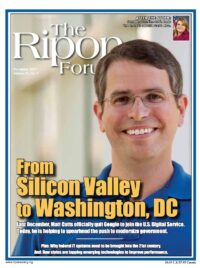
As an institution, Congress does not appear very different than it did 200 years ago. It remains a two-chamber legislative body, one apportioned by population and the other by state. Members introduce bills, debate legislation, meet with constituents, cast votes, and enact laws. Business is conducted under rules based on Jefferson’s Manual of parliamentary procedure. A visitor from 1790 who wandered into the House gallery would not find the proceeding particularly difficult to follow.
Below the surface, however, the institution has changed dramatically. Membership has grown from 59 Representatives and 26 Senators in the first Congress to the current 435 Representatives and 100 Senators. While 19th century sessions were often as short as three months, contemporary Congresses typically meet year round. And for much of American history, committees had very small staffs, and individual members had no staff support; today, over 20,000 staffers support the legislative process.
Many of these changes have been in response to external changes in society. Geographic expansion, population growth, and technological developments all expanded the range of issues before the nation. An increasingly integrated national economy expanded the role of the federal government, particularly after the Great Depression and World War II. As the volume, scope, and complexity of issues increased, Congress responded by reorganizing and building its own capacity, most notably in the 1946 and 1970 Congressional Reorganizations Acts. These laws reformed committee jurisdiction, increased staff support, and developed non-partisan legislative branch institutions, with the goal of enhancing legislative and oversight capabilities.
In a recent Congressional Management Foundation survey, only 11% thought Congress had adequate capacity to “perform its role in democracy.”
Is the contemporary Congress in need of similar reform? There is wide agreement in Washington that Congress is dysfunctional. The legislative process is mired in gridlock. Congress lurches from deadline to deadline, often acting only when forced by impending government shutdowns or debt defaults. Routine oversight of the executive branch has weakened substantially. And an increasing number of early retiring Members cite these problems as reason for their departure.
Many observers believe the key to modernizing Congress is to remove impediments to quick and decisive action. Following Woodrow Wilson’s century-old advice, these critics would eliminate the filibuster, reduce the gatekeeping power of committees, strengthen the influence of chamber leaders over rank-and-file members, and shift policy formulation away from Congress and toward the executive branch. The appeal of these reforms lies in their ability to harness the modern realities of party polarization, and the desire to supplant the messiness and parochialism of the legislative process with the rationality and decisiveness of executive governance. The downside is that they envision a hollowed-out parliamentary-style legislature, in which real policymaking occurs elsewhere.
A better alternative is to enhance Congress’s capacity as a transformative institution within the separation of powers system. Instead of accepting polarization as the defining feature of the legislature, reformers should work to attenuate it by enhancing the capacity of individuals and groups of members to develop policy and conduct rigorous oversight. In this view, modernization would serve to enhance the power and functioning of Congress, not minimize its role, and allow us to retain the unique benefits of legislative government: diversity of representation, public deliberation, and checking executive power.
Two areas of reform that would strengthen Congress are: (1) increased resources for individual members and committees; and (2) rules changes to empower the committee system. Neither would usher in a golden age of congressional power and functionality, but both would begin the process of rebuilding the deliberative and policymaking strength of the institution.
While numerous process reforms could strengthen policymaking, the lowest-hanging fruit would be to strengthen the role of committees.
Information is vital to the legislative process. Members of Congress must gather and analyze policy information in order to make informed votes, present alternative policy positions, and craft political arguments to defend their positions. Without the resources to hire their own staff, members become reliant on others for legislative information. By and large, current members do not believe they have the necessary staff; in a recent Congressional Management Foundation survey, only 6% of senior staff reported being “very satisfied” that Members had adequate time and resources to understand and consider legislation. Only 11% thought Congress had adequate capacity to “perform its role in democracy.”
Modern pressures are exacerbating this capacity problem. First, austerity budgets have caused members’ financial resources to decline in real dollars over the last decade. This not only prevents the hiring of enough staff, but also constrains staff salaries. Staff who develop significant expertise often leave the Hill for more lucrative opportunities. Simultaneously, technology has increased the demands of constituent communications on Member offices, leaving fewer staff to handle policy. Finally, easy availability of policy information has enlarged the sphere of knowledge necessary to develop true expertise. With less money and fewer staff chasing more information, members invariably rely on outside groups and, in particular, party leadership to guide their thinking. This has fueled partisanship and reduced the ability of members to engage in substantive deliberation.
Similarly, committee staffing in Congress has never recovered from cuts made two decades ago. While committees are largely insulated from increased constituent communications, they struggle even more than personal offices with staff retention. Providing extra funding for committees to conduct oversight might also encourage them to not only engage in greater levels of oversight, but also to invest in the development of the necessary staff expertise to rigorously monitor the executive branch. An immediate increase in the resources of members and committees would serve to devolve power away from the leadership, encourage informed deliberation, and create a broader expertise in both policymaking and oversight.
Resources alone, however, would be of limited value toward restoring genuine deliberation in Congress without corresponding reform of the process. While numerous process reforms could strengthen policymaking, the lowest-hanging fruit would be to strengthen the role of committees. In recent decades, an increasing proportion of major legislation has been crafted outside the committee system, with leadership taking the lead in partnership with allied committee chairs, and the rank-and-file mostly left out. Such bills are now routinely brought to the House floor under highly restrictive rules, and floor amendments in the Senate have plummeted. This subverts genuine deliberation, discourages rank-and-file members from participating in policymaking or developing expertise, and exposes Congress to greater executive influence.
In particular, Republicans should dispense with term limits for committee chairs. Likewise, party rules could be amended to reduce leadership power over committee assignments.
Reversing these trends requires majority party rank-and-file members to demand more committee autonomy and refuse to consent to tightly structured rules for floor debate. There are, however, specific rules changes that would increase committee power. In particular, Republicans should dispense with term limits for committee chairs. This limit has reduced both the ability of chairs to become true experts in their jurisdiction, and given them less incentive to defend committee power against leadership encroachment. Likewise, party rules could be amended to reduce leadership power over committee assignments.
Neither of these reforms – strengthening the committee system or increasing member resources – will be easy to institute. And the Wilsonian impulse to further streamline Congress into a vessel for rapid approval of administration or party policy is ever-present. But the long-term health of Congress as an independent institution within our separation of powers system depends on reforming Congress in a way that strengthens, rather than bypasses, its deliberative features.
Matt Glassman is a senior fellow at the Government Affairs Institute at Georgetown University. He previously worked for the Congressional Research Service, where his portfolio included congressional operations, separation of powers, appropriations, judicial administration, agency design, and congressional history.




